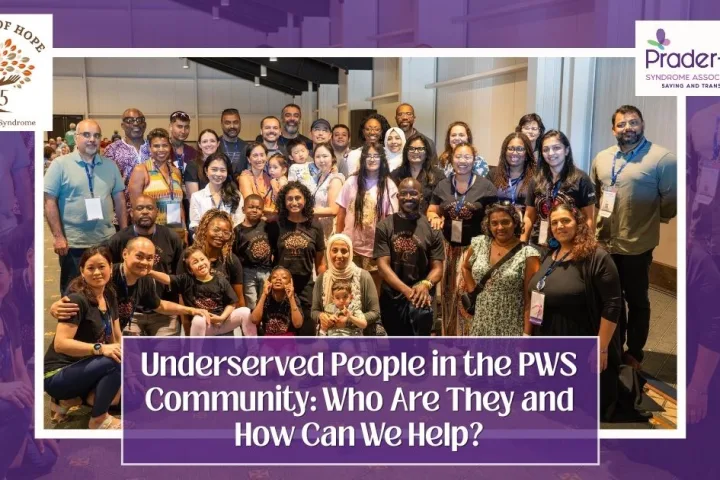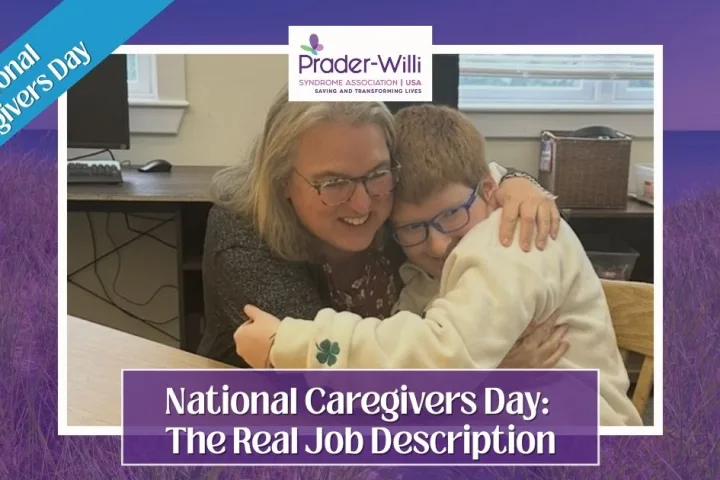Summer is the perfect opportunity to spend time with your family, have fun, and de-stress. Whether you are hiking near a remote waterfall, camping in your own backyard, riding bikes through the neighborhood, or running through the sprinkler, doing it as a family makes it more fun and helps create life-long memories.
Individuals with Prader-Willi syndrome can take part in summer fun too, but because children and adults with the syndrome often have difficulty regulating body temperature (and can then overheat easily), parents and caregivers must take certain precautions to protect their loved one. Here are some tips to help make summer fun for everyone:
- Capitalize on the cooler temperatures in the early morning and evening and plan your outdoor activities during those times.
- Carry an umbrella with you to block out the sun’s direct rays.
- Always wear sunscreen!
- Always keep frozen water bottles or cold drinks with you.
- Cool your car down before getting into it.
- Keep battery operated fans in your car and larger fans in your home.
- When traveling, keep a cooler with ice packs, wet towels, and water bottles with you in case of a heat-related emergency.
- Technology is advancing and that includes body cooling technology. Invest in a cooling vest, frogger towel, or cooling gel pads which can all found in your local sporting goods store.
Despite taking precautions, your loved one may experience a heat-related problem such as heat exhaustion or heat stroke. Heat exhaustion is an urgent situation that includes heavy sweating, rapid pulse, dizziness, fatigue, goose bumps, and often nausea and headache. A person with PWS might not experience all these symptoms, so look for red cheeks, exhaustion, and fatigue. If you suspect your loved one is having heat exhaustion you must work quickly to cool them down. Move them into a cool place with good air circulation, remove any wet clothing, and use cold, wet towels to cool the skin. Focus on the arm pits, neck, and groin as the largest blood vessels are in those areas.
Heat stroke is an emergency and requires immediate medical assistance…Call 9-1-1! When someone is suffering from heat stroke they are no longer sweating, and they might be confused and even collapse. While waiting for first responders to arrive, continue all efforts mentioned above to rapidly reduce body temperature.
Contributed by Stacy Ward, Director of Family Support





 Perry A. Zirkel has written more than 1,500 publications on various aspects of school law, with an emphasis on legal issues in special education. He writes a regular column for NAESP’s Principal magazine and NASP’s Communiqué newsletter, and he did so previously for Phi Delta Kappan and Teaching Exceptional Children.
Perry A. Zirkel has written more than 1,500 publications on various aspects of school law, with an emphasis on legal issues in special education. He writes a regular column for NAESP’s Principal magazine and NASP’s Communiqué newsletter, and he did so previously for Phi Delta Kappan and Teaching Exceptional Children. Jennifer Bolander has been serving as a Special Education Specialist for PWSA (USA) since October of 2015. She is a graduate of John Carroll University and lives in Ohio with her husband Brad and daughters Kate (17), and Sophia (13) who was born with PWS.
Jennifer Bolander has been serving as a Special Education Specialist for PWSA (USA) since October of 2015. She is a graduate of John Carroll University and lives in Ohio with her husband Brad and daughters Kate (17), and Sophia (13) who was born with PWS. Dr. Amy McTighe is the PWS Program Manager and Inpatient Teacher at the Center for Prader-Willi Syndrome at the Children’s Institute of Pittsburgh. She graduated from Duquesne University receiving her Bachelor’s and Master’s degree in Education with a focus on elementary education, special education, and language arts.
Dr. Amy McTighe is the PWS Program Manager and Inpatient Teacher at the Center for Prader-Willi Syndrome at the Children’s Institute of Pittsburgh. She graduated from Duquesne University receiving her Bachelor’s and Master’s degree in Education with a focus on elementary education, special education, and language arts. Evan has worked with the Prader-Willi Syndrome Association (USA) since 2007 primarily as a Crisis Intervention and Family Support Counselor. Evans works with parents and schools to foster strong collaborative relationships and appropriate educational environments for students with PWS.
Evan has worked with the Prader-Willi Syndrome Association (USA) since 2007 primarily as a Crisis Intervention and Family Support Counselor. Evans works with parents and schools to foster strong collaborative relationships and appropriate educational environments for students with PWS. Staci Zimmerman works for Prader-Willi Syndrome Association of Colorado as an Individualized Education Program (IEP) consultant. Staci collaborates with the PWS multi-disciplinary clinic at the Children’s Hospital in Denver supporting families and school districts around the United States with their child’s Individual Educational Plan.
Staci Zimmerman works for Prader-Willi Syndrome Association of Colorado as an Individualized Education Program (IEP) consultant. Staci collaborates with the PWS multi-disciplinary clinic at the Children’s Hospital in Denver supporting families and school districts around the United States with their child’s Individual Educational Plan. Founded in 2001, SDLC is a non-profit legal services organization dedicated to protecting and advancing the legal rights of people with disabilities throughout the South. It partners with the Southern Poverty Law Center, Protection and Advocacy (P&A) programs, Legal Services Corporations (LSC) and disability organizations on major, systemic disability rights issues involving the Individuals with Disabilities Education Act (IDEA), Americans with Disabilities Act (ADA), and the federal Medicaid Act. Recently in November 2014, Jim retired.
Founded in 2001, SDLC is a non-profit legal services organization dedicated to protecting and advancing the legal rights of people with disabilities throughout the South. It partners with the Southern Poverty Law Center, Protection and Advocacy (P&A) programs, Legal Services Corporations (LSC) and disability organizations on major, systemic disability rights issues involving the Individuals with Disabilities Education Act (IDEA), Americans with Disabilities Act (ADA), and the federal Medicaid Act. Recently in November 2014, Jim retired.